Organizational Behavior at A David & Co Limited: Report Analysis
VerifiedAdded on 2021/01/01
|14
|4466
|195
Report
AI Summary
This report provides an in-depth analysis of organizational behavior within A David & Co Limited, an American food flavor company. It examines the influence of organizational culture, politics, and power on individual and team performance, utilizing Charles Handy's model to explore different cultural types. The report delves into motivational theories, including Maslow's hierarchy of needs and the ERG theory, to understand employee motivation. Furthermore, it differentiates between effective and ineffective teams, highlighting factors such as coordination, trust, and conflict resolution. The report also discusses the concepts and philosophies of organizational behavior, offering insights into how A David & Co Limited can foster a productive and collaborative work environment. The report concludes with an overview of key findings and recommendations for improving organizational effectiveness.
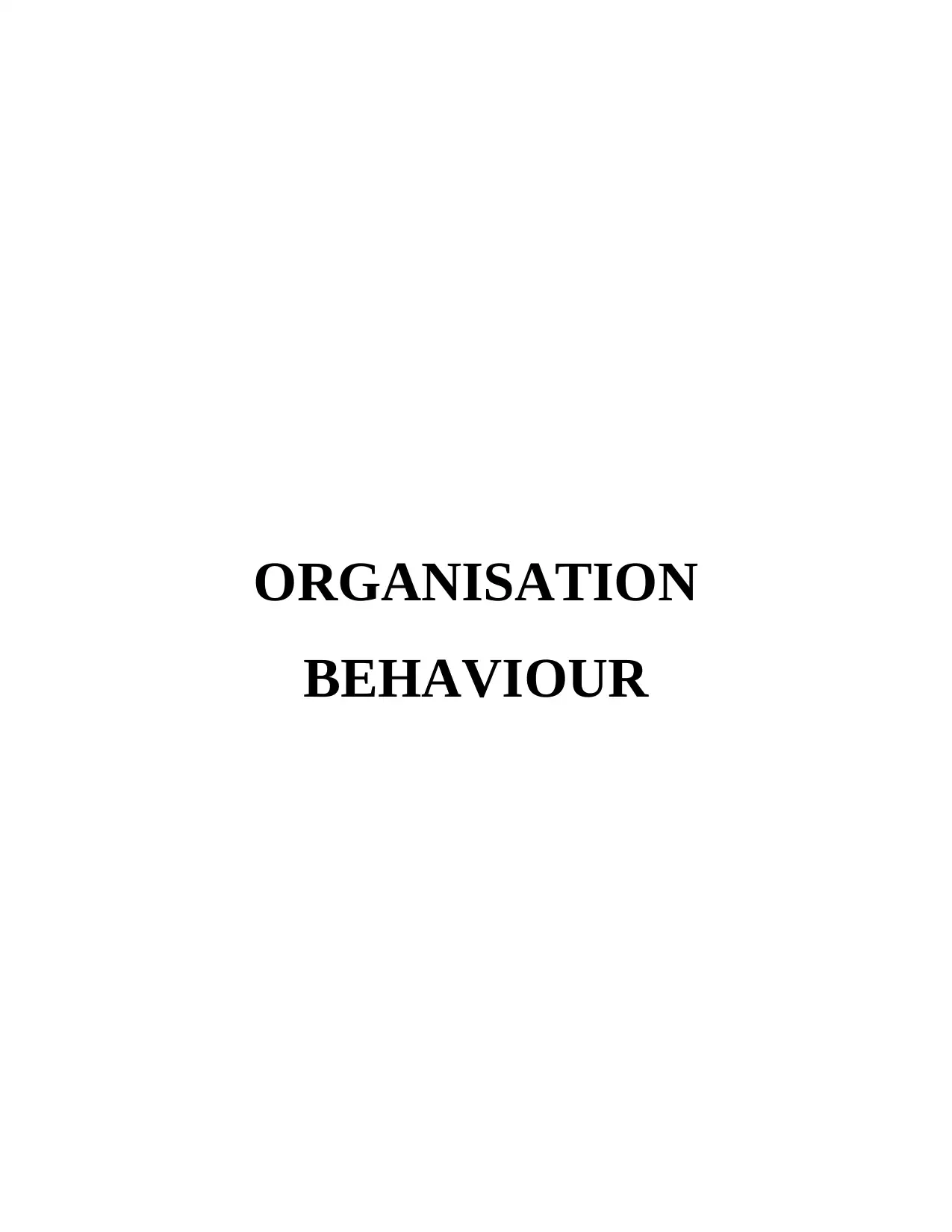
ORGANISATION
BEHAVIOUR
BEHAVIOUR
Paraphrase This Document
Need a fresh take? Get an instant paraphrase of this document with our AI Paraphraser
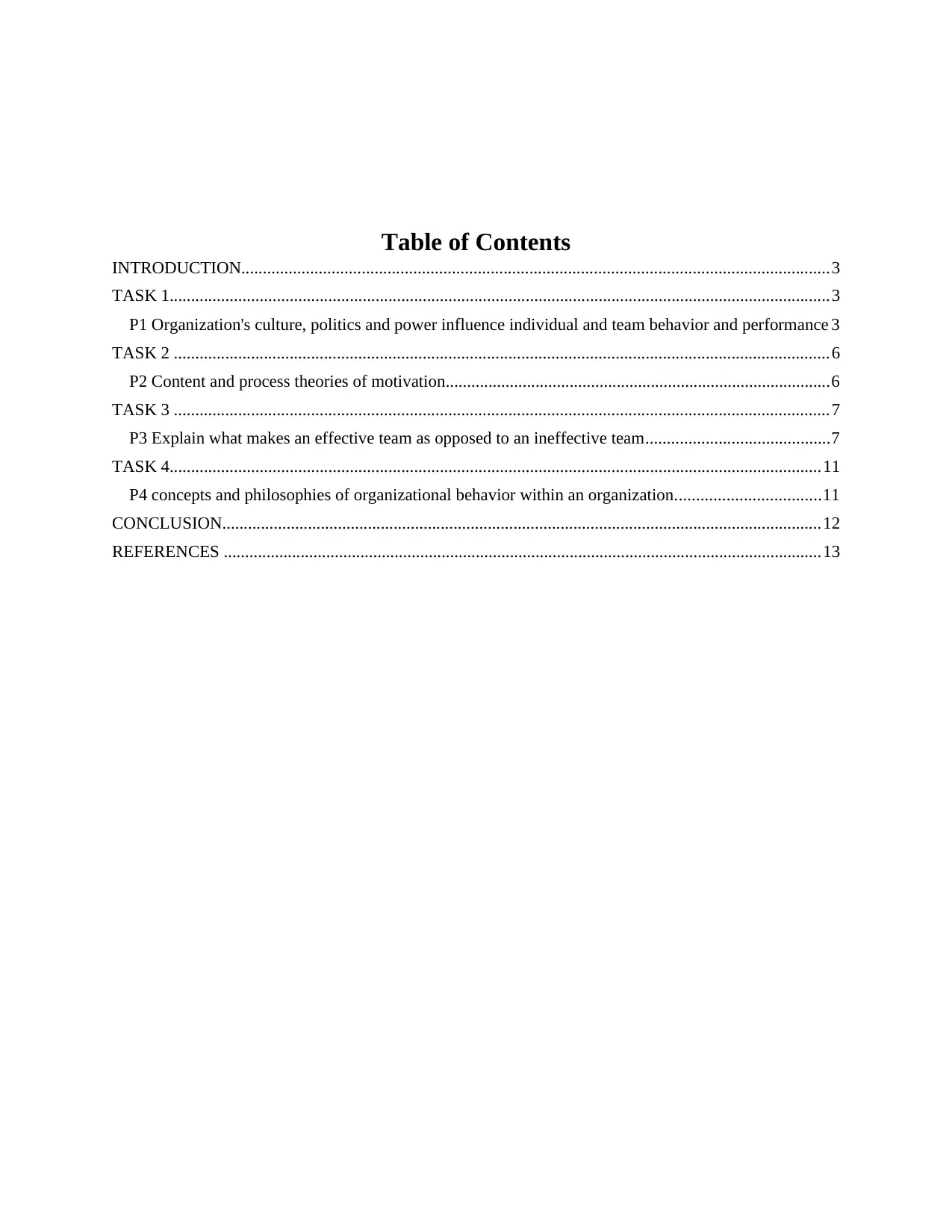
Table of Contents
INTRODUCTION.........................................................................................................................................3
TASK 1..........................................................................................................................................................3
P1 Organization's culture, politics and power influence individual and team behavior and performance 3
TASK 2 .........................................................................................................................................................6
P2 Content and process theories of motivation..........................................................................................6
TASK 3 .........................................................................................................................................................7
P3 Explain what makes an effective team as opposed to an ineffective team...........................................7
TASK 4........................................................................................................................................................11
P4 concepts and philosophies of organizational behavior within an organization..................................11
CONCLUSION............................................................................................................................................12
REFERENCES ............................................................................................................................................13
INTRODUCTION.........................................................................................................................................3
TASK 1..........................................................................................................................................................3
P1 Organization's culture, politics and power influence individual and team behavior and performance 3
TASK 2 .........................................................................................................................................................6
P2 Content and process theories of motivation..........................................................................................6
TASK 3 .........................................................................................................................................................7
P3 Explain what makes an effective team as opposed to an ineffective team...........................................7
TASK 4........................................................................................................................................................11
P4 concepts and philosophies of organizational behavior within an organization..................................11
CONCLUSION............................................................................................................................................12
REFERENCES ............................................................................................................................................13
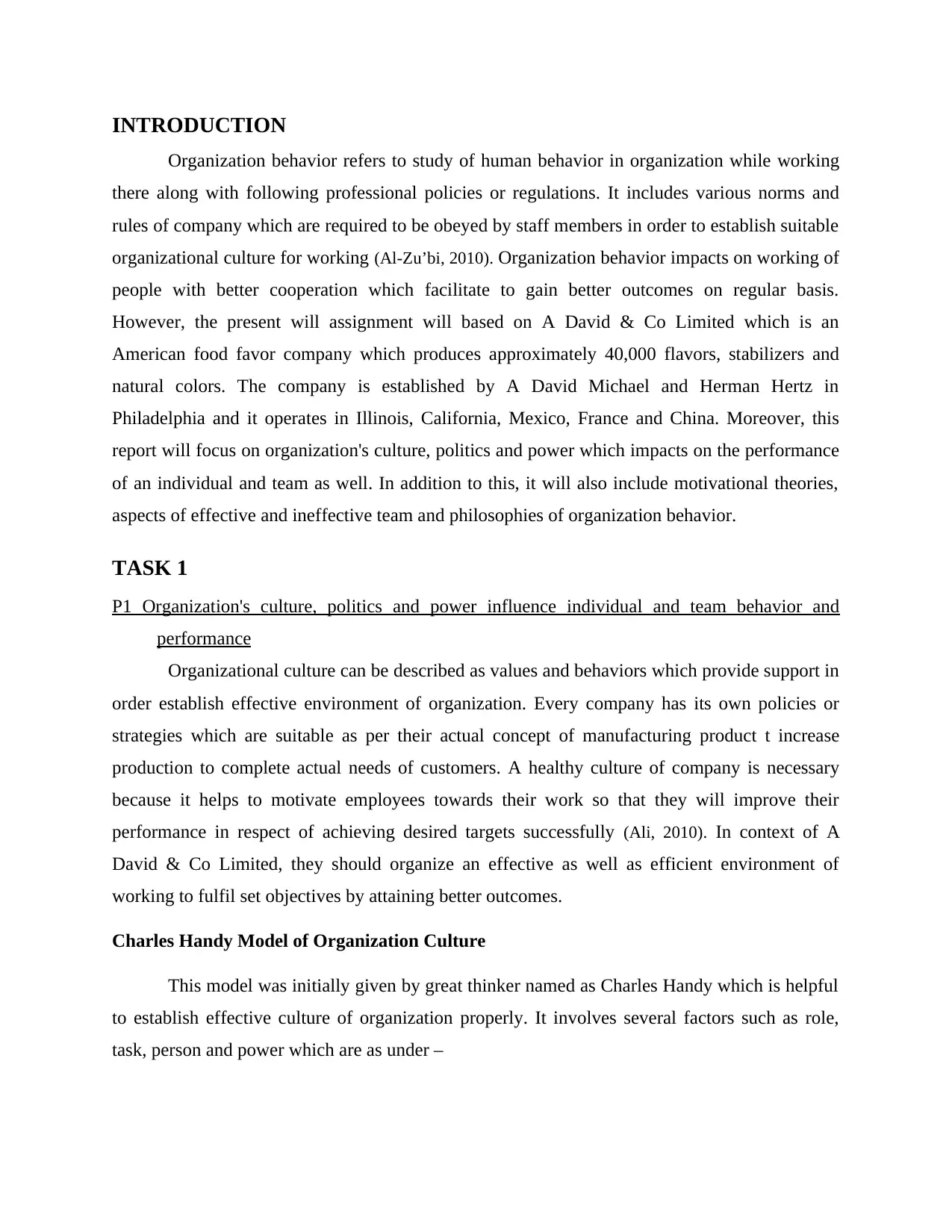
INTRODUCTION
Organization behavior refers to study of human behavior in organization while working
there along with following professional policies or regulations. It includes various norms and
rules of company which are required to be obeyed by staff members in order to establish suitable
organizational culture for working (Al-Zu’bi, 2010). Organization behavior impacts on working of
people with better cooperation which facilitate to gain better outcomes on regular basis.
However, the present will assignment will based on A David & Co Limited which is an
American food favor company which produces approximately 40,000 flavors, stabilizers and
natural colors. The company is established by A David Michael and Herman Hertz in
Philadelphia and it operates in Illinois, California, Mexico, France and China. Moreover, this
report will focus on organization's culture, politics and power which impacts on the performance
of an individual and team as well. In addition to this, it will also include motivational theories,
aspects of effective and ineffective team and philosophies of organization behavior.
TASK 1
P1 Organization's culture, politics and power influence individual and team behavior and
performance
Organizational culture can be described as values and behaviors which provide support in
order establish effective environment of organization. Every company has its own policies or
strategies which are suitable as per their actual concept of manufacturing product t increase
production to complete actual needs of customers. A healthy culture of company is necessary
because it helps to motivate employees towards their work so that they will improve their
performance in respect of achieving desired targets successfully (Ali, 2010). In context of A
David & Co Limited, they should organize an effective as well as efficient environment of
working to fulfil set objectives by attaining better outcomes.
Charles Handy Model of Organization Culture
This model was initially given by great thinker named as Charles Handy which is helpful
to establish effective culture of organization properly. It involves several factors such as role,
task, person and power which are as under –
Organization behavior refers to study of human behavior in organization while working
there along with following professional policies or regulations. It includes various norms and
rules of company which are required to be obeyed by staff members in order to establish suitable
organizational culture for working (Al-Zu’bi, 2010). Organization behavior impacts on working of
people with better cooperation which facilitate to gain better outcomes on regular basis.
However, the present will assignment will based on A David & Co Limited which is an
American food favor company which produces approximately 40,000 flavors, stabilizers and
natural colors. The company is established by A David Michael and Herman Hertz in
Philadelphia and it operates in Illinois, California, Mexico, France and China. Moreover, this
report will focus on organization's culture, politics and power which impacts on the performance
of an individual and team as well. In addition to this, it will also include motivational theories,
aspects of effective and ineffective team and philosophies of organization behavior.
TASK 1
P1 Organization's culture, politics and power influence individual and team behavior and
performance
Organizational culture can be described as values and behaviors which provide support in
order establish effective environment of organization. Every company has its own policies or
strategies which are suitable as per their actual concept of manufacturing product t increase
production to complete actual needs of customers. A healthy culture of company is necessary
because it helps to motivate employees towards their work so that they will improve their
performance in respect of achieving desired targets successfully (Ali, 2010). In context of A
David & Co Limited, they should organize an effective as well as efficient environment of
working to fulfil set objectives by attaining better outcomes.
Charles Handy Model of Organization Culture
This model was initially given by great thinker named as Charles Handy which is helpful
to establish effective culture of organization properly. It involves several factors such as role,
task, person and power which are as under –
⊘ This is a preview!⊘
Do you want full access?
Subscribe today to unlock all pages.

Trusted by 1+ million students worldwide
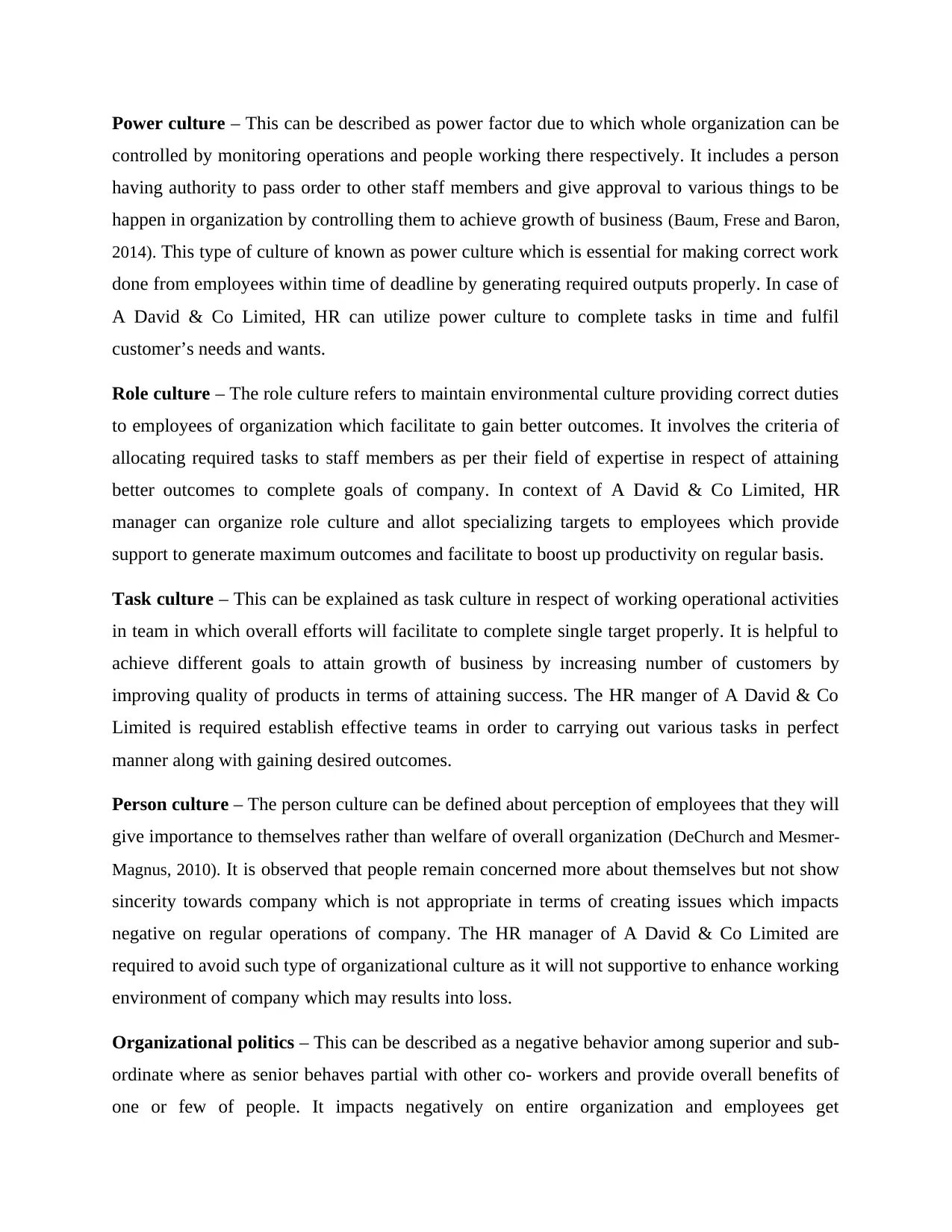
Power culture – This can be described as power factor due to which whole organization can be
controlled by monitoring operations and people working there respectively. It includes a person
having authority to pass order to other staff members and give approval to various things to be
happen in organization by controlling them to achieve growth of business (Baum, Frese and Baron,
2014). This type of culture of known as power culture which is essential for making correct work
done from employees within time of deadline by generating required outputs properly. In case of
A David & Co Limited, HR can utilize power culture to complete tasks in time and fulfil
customer’s needs and wants.
Role culture – The role culture refers to maintain environmental culture providing correct duties
to employees of organization which facilitate to gain better outcomes. It involves the criteria of
allocating required tasks to staff members as per their field of expertise in respect of attaining
better outcomes to complete goals of company. In context of A David & Co Limited, HR
manager can organize role culture and allot specializing targets to employees which provide
support to generate maximum outcomes and facilitate to boost up productivity on regular basis.
Task culture – This can be explained as task culture in respect of working operational activities
in team in which overall efforts will facilitate to complete single target properly. It is helpful to
achieve different goals to attain growth of business by increasing number of customers by
improving quality of products in terms of attaining success. The HR manger of A David & Co
Limited is required establish effective teams in order to carrying out various tasks in perfect
manner along with gaining desired outcomes.
Person culture – The person culture can be defined about perception of employees that they will
give importance to themselves rather than welfare of overall organization (DeChurch and Mesmer-
Magnus, 2010). It is observed that people remain concerned more about themselves but not show
sincerity towards company which is not appropriate in terms of creating issues which impacts
negative on regular operations of company. The HR manager of A David & Co Limited are
required to avoid such type of organizational culture as it will not supportive to enhance working
environment of company which may results into loss.
Organizational politics – This can be described as a negative behavior among superior and sub-
ordinate where as senior behaves partial with other co- workers and provide overall benefits of
one or few of people. It impacts negatively on entire organization and employees get
controlled by monitoring operations and people working there respectively. It includes a person
having authority to pass order to other staff members and give approval to various things to be
happen in organization by controlling them to achieve growth of business (Baum, Frese and Baron,
2014). This type of culture of known as power culture which is essential for making correct work
done from employees within time of deadline by generating required outputs properly. In case of
A David & Co Limited, HR can utilize power culture to complete tasks in time and fulfil
customer’s needs and wants.
Role culture – The role culture refers to maintain environmental culture providing correct duties
to employees of organization which facilitate to gain better outcomes. It involves the criteria of
allocating required tasks to staff members as per their field of expertise in respect of attaining
better outcomes to complete goals of company. In context of A David & Co Limited, HR
manager can organize role culture and allot specializing targets to employees which provide
support to generate maximum outcomes and facilitate to boost up productivity on regular basis.
Task culture – This can be explained as task culture in respect of working operational activities
in team in which overall efforts will facilitate to complete single target properly. It is helpful to
achieve different goals to attain growth of business by increasing number of customers by
improving quality of products in terms of attaining success. The HR manger of A David & Co
Limited is required establish effective teams in order to carrying out various tasks in perfect
manner along with gaining desired outcomes.
Person culture – The person culture can be defined about perception of employees that they will
give importance to themselves rather than welfare of overall organization (DeChurch and Mesmer-
Magnus, 2010). It is observed that people remain concerned more about themselves but not show
sincerity towards company which is not appropriate in terms of creating issues which impacts
negative on regular operations of company. The HR manager of A David & Co Limited are
required to avoid such type of organizational culture as it will not supportive to enhance working
environment of company which may results into loss.
Organizational politics – This can be described as a negative behavior among superior and sub-
ordinate where as senior behaves partial with other co- workers and provide overall benefits of
one or few of people. It impacts negatively on entire organization and employees get
Paraphrase This Document
Need a fresh take? Get an instant paraphrase of this document with our AI Paraphraser
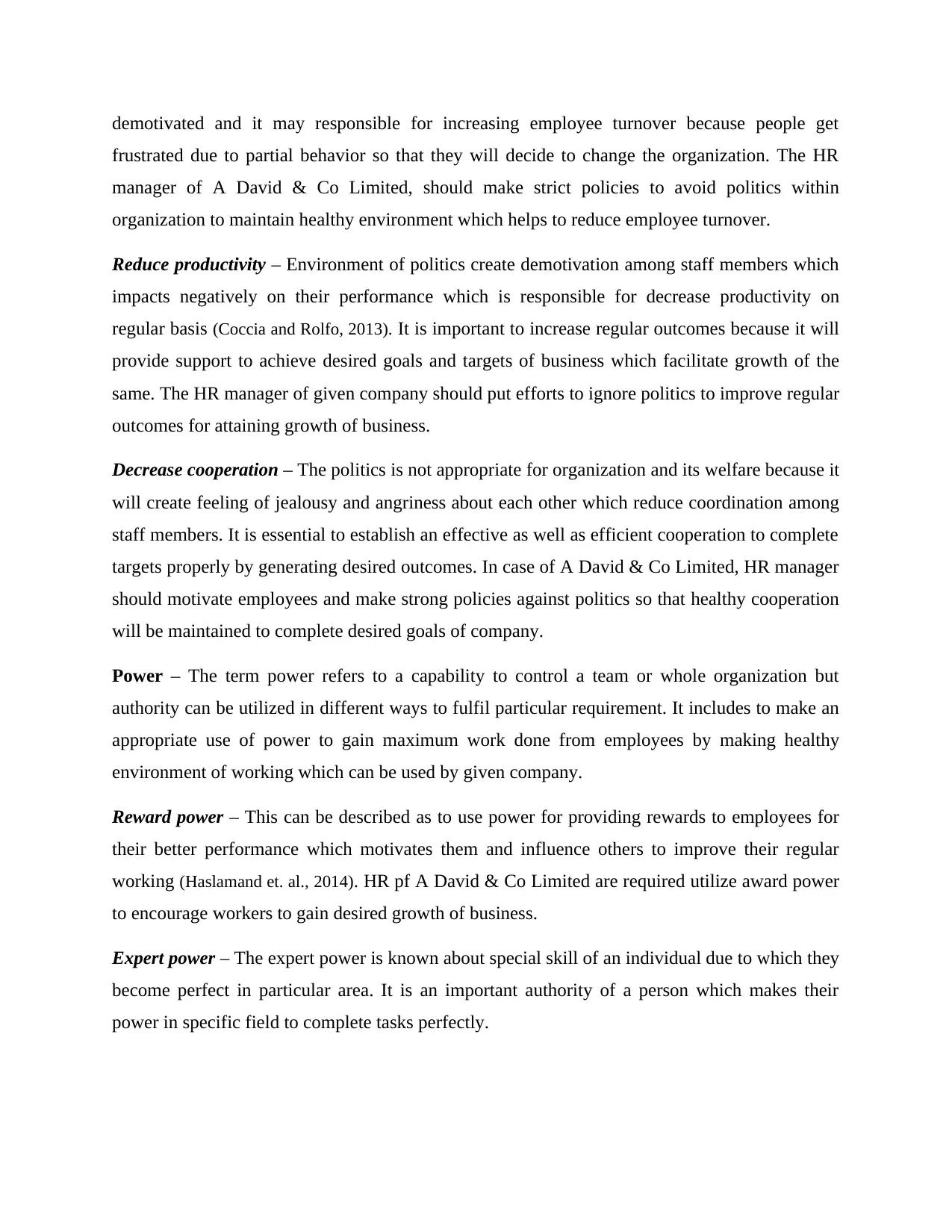
demotivated and it may responsible for increasing employee turnover because people get
frustrated due to partial behavior so that they will decide to change the organization. The HR
manager of A David & Co Limited, should make strict policies to avoid politics within
organization to maintain healthy environment which helps to reduce employee turnover.
Reduce productivity – Environment of politics create demotivation among staff members which
impacts negatively on their performance which is responsible for decrease productivity on
regular basis (Coccia and Rolfo, 2013). It is important to increase regular outcomes because it will
provide support to achieve desired goals and targets of business which facilitate growth of the
same. The HR manager of given company should put efforts to ignore politics to improve regular
outcomes for attaining growth of business.
Decrease cooperation – The politics is not appropriate for organization and its welfare because it
will create feeling of jealousy and angriness about each other which reduce coordination among
staff members. It is essential to establish an effective as well as efficient cooperation to complete
targets properly by generating desired outcomes. In case of A David & Co Limited, HR manager
should motivate employees and make strong policies against politics so that healthy cooperation
will be maintained to complete desired goals of company.
Power – The term power refers to a capability to control a team or whole organization but
authority can be utilized in different ways to fulfil particular requirement. It includes to make an
appropriate use of power to gain maximum work done from employees by making healthy
environment of working which can be used by given company.
Reward power – This can be described as to use power for providing rewards to employees for
their better performance which motivates them and influence others to improve their regular
working (Haslamand et. al., 2014). HR pf A David & Co Limited are required utilize award power
to encourage workers to gain desired growth of business.
Expert power – The expert power is known about special skill of an individual due to which they
become perfect in particular area. It is an important authority of a person which makes their
power in specific field to complete tasks perfectly.
frustrated due to partial behavior so that they will decide to change the organization. The HR
manager of A David & Co Limited, should make strict policies to avoid politics within
organization to maintain healthy environment which helps to reduce employee turnover.
Reduce productivity – Environment of politics create demotivation among staff members which
impacts negatively on their performance which is responsible for decrease productivity on
regular basis (Coccia and Rolfo, 2013). It is important to increase regular outcomes because it will
provide support to achieve desired goals and targets of business which facilitate growth of the
same. The HR manager of given company should put efforts to ignore politics to improve regular
outcomes for attaining growth of business.
Decrease cooperation – The politics is not appropriate for organization and its welfare because it
will create feeling of jealousy and angriness about each other which reduce coordination among
staff members. It is essential to establish an effective as well as efficient cooperation to complete
targets properly by generating desired outcomes. In case of A David & Co Limited, HR manager
should motivate employees and make strong policies against politics so that healthy cooperation
will be maintained to complete desired goals of company.
Power – The term power refers to a capability to control a team or whole organization but
authority can be utilized in different ways to fulfil particular requirement. It includes to make an
appropriate use of power to gain maximum work done from employees by making healthy
environment of working which can be used by given company.
Reward power – This can be described as to use power for providing rewards to employees for
their better performance which motivates them and influence others to improve their regular
working (Haslamand et. al., 2014). HR pf A David & Co Limited are required utilize award power
to encourage workers to gain desired growth of business.
Expert power – The expert power is known about special skill of an individual due to which they
become perfect in particular area. It is an important authority of a person which makes their
power in specific field to complete tasks perfectly.
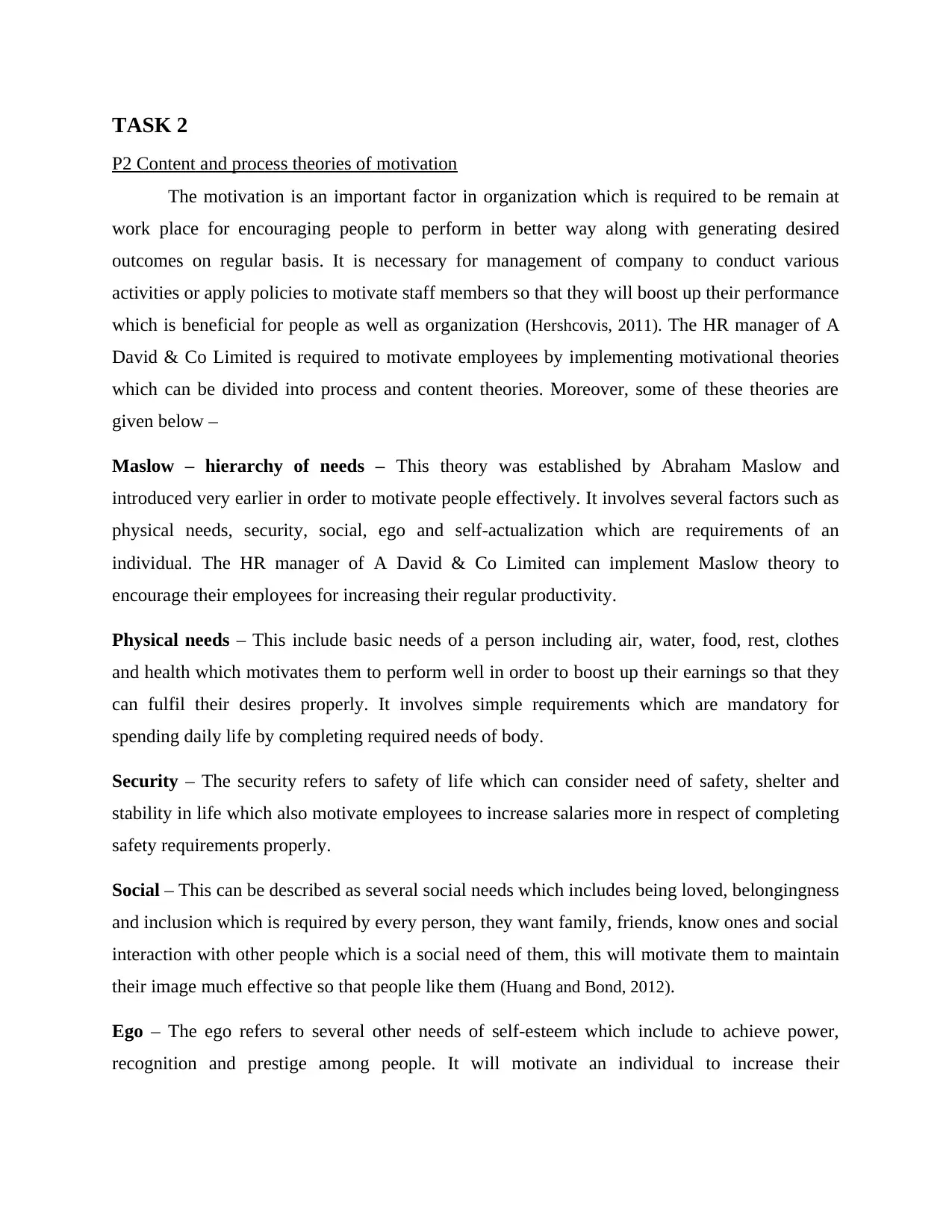
TASK 2
P2 Content and process theories of motivation
The motivation is an important factor in organization which is required to be remain at
work place for encouraging people to perform in better way along with generating desired
outcomes on regular basis. It is necessary for management of company to conduct various
activities or apply policies to motivate staff members so that they will boost up their performance
which is beneficial for people as well as organization (Hershcovis, 2011). The HR manager of A
David & Co Limited is required to motivate employees by implementing motivational theories
which can be divided into process and content theories. Moreover, some of these theories are
given below –
Maslow – hierarchy of needs – This theory was established by Abraham Maslow and
introduced very earlier in order to motivate people effectively. It involves several factors such as
physical needs, security, social, ego and self-actualization which are requirements of an
individual. The HR manager of A David & Co Limited can implement Maslow theory to
encourage their employees for increasing their regular productivity.
Physical needs – This include basic needs of a person including air, water, food, rest, clothes
and health which motivates them to perform well in order to boost up their earnings so that they
can fulfil their desires properly. It involves simple requirements which are mandatory for
spending daily life by completing required needs of body.
Security – The security refers to safety of life which can consider need of safety, shelter and
stability in life which also motivate employees to increase salaries more in respect of completing
safety requirements properly.
Social – This can be described as several social needs which includes being loved, belongingness
and inclusion which is required by every person, they want family, friends, know ones and social
interaction with other people which is a social need of them, this will motivate them to maintain
their image much effective so that people like them (Huang and Bond, 2012).
Ego – The ego refers to several other needs of self-esteem which include to achieve power,
recognition and prestige among people. It will motivate an individual to increase their
P2 Content and process theories of motivation
The motivation is an important factor in organization which is required to be remain at
work place for encouraging people to perform in better way along with generating desired
outcomes on regular basis. It is necessary for management of company to conduct various
activities or apply policies to motivate staff members so that they will boost up their performance
which is beneficial for people as well as organization (Hershcovis, 2011). The HR manager of A
David & Co Limited is required to motivate employees by implementing motivational theories
which can be divided into process and content theories. Moreover, some of these theories are
given below –
Maslow – hierarchy of needs – This theory was established by Abraham Maslow and
introduced very earlier in order to motivate people effectively. It involves several factors such as
physical needs, security, social, ego and self-actualization which are requirements of an
individual. The HR manager of A David & Co Limited can implement Maslow theory to
encourage their employees for increasing their regular productivity.
Physical needs – This include basic needs of a person including air, water, food, rest, clothes
and health which motivates them to perform well in order to boost up their earnings so that they
can fulfil their desires properly. It involves simple requirements which are mandatory for
spending daily life by completing required needs of body.
Security – The security refers to safety of life which can consider need of safety, shelter and
stability in life which also motivate employees to increase salaries more in respect of completing
safety requirements properly.
Social – This can be described as several social needs which includes being loved, belongingness
and inclusion which is required by every person, they want family, friends, know ones and social
interaction with other people which is a social need of them, this will motivate them to maintain
their image much effective so that people like them (Huang and Bond, 2012).
Ego – The ego refers to several other needs of self-esteem which include to achieve power,
recognition and prestige among people. It will motivate an individual to increase their
⊘ This is a preview!⊘
Do you want full access?
Subscribe today to unlock all pages.

Trusted by 1+ million students worldwide
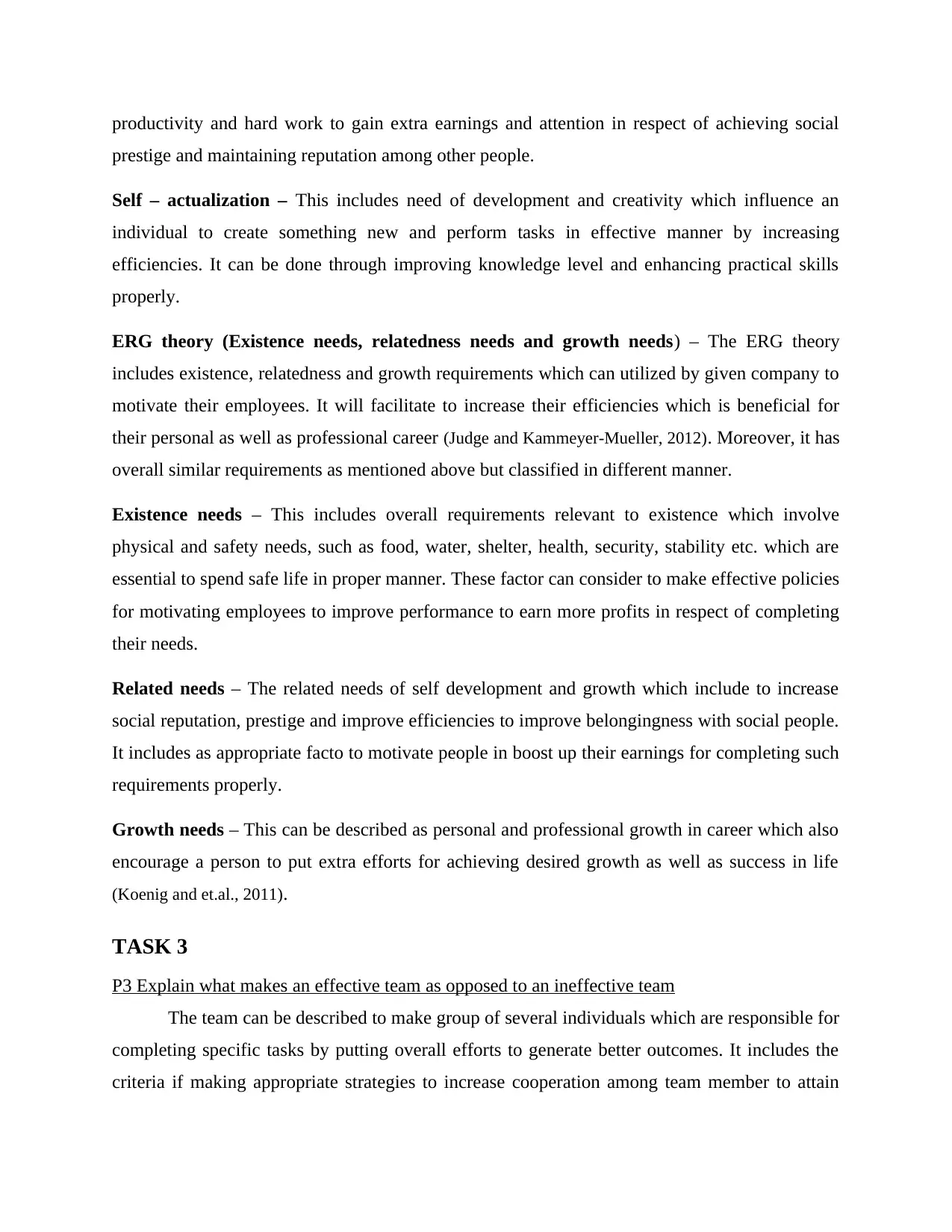
productivity and hard work to gain extra earnings and attention in respect of achieving social
prestige and maintaining reputation among other people.
Self – actualization – This includes need of development and creativity which influence an
individual to create something new and perform tasks in effective manner by increasing
efficiencies. It can be done through improving knowledge level and enhancing practical skills
properly.
ERG theory (Existence needs, relatedness needs and growth needs) – The ERG theory
includes existence, relatedness and growth requirements which can utilized by given company to
motivate their employees. It will facilitate to increase their efficiencies which is beneficial for
their personal as well as professional career (Judge and Kammeyer‐Mueller, 2012). Moreover, it has
overall similar requirements as mentioned above but classified in different manner.
Existence needs – This includes overall requirements relevant to existence which involve
physical and safety needs, such as food, water, shelter, health, security, stability etc. which are
essential to spend safe life in proper manner. These factor can consider to make effective policies
for motivating employees to improve performance to earn more profits in respect of completing
their needs.
Related needs – The related needs of self development and growth which include to increase
social reputation, prestige and improve efficiencies to improve belongingness with social people.
It includes as appropriate facto to motivate people in boost up their earnings for completing such
requirements properly.
Growth needs – This can be described as personal and professional growth in career which also
encourage a person to put extra efforts for achieving desired growth as well as success in life
(Koenig and et.al., 2011).
TASK 3
P3 Explain what makes an effective team as opposed to an ineffective team
The team can be described to make group of several individuals which are responsible for
completing specific tasks by putting overall efforts to generate better outcomes. It includes the
criteria if making appropriate strategies to increase cooperation among team member to attain
prestige and maintaining reputation among other people.
Self – actualization – This includes need of development and creativity which influence an
individual to create something new and perform tasks in effective manner by increasing
efficiencies. It can be done through improving knowledge level and enhancing practical skills
properly.
ERG theory (Existence needs, relatedness needs and growth needs) – The ERG theory
includes existence, relatedness and growth requirements which can utilized by given company to
motivate their employees. It will facilitate to increase their efficiencies which is beneficial for
their personal as well as professional career (Judge and Kammeyer‐Mueller, 2012). Moreover, it has
overall similar requirements as mentioned above but classified in different manner.
Existence needs – This includes overall requirements relevant to existence which involve
physical and safety needs, such as food, water, shelter, health, security, stability etc. which are
essential to spend safe life in proper manner. These factor can consider to make effective policies
for motivating employees to improve performance to earn more profits in respect of completing
their needs.
Related needs – The related needs of self development and growth which include to increase
social reputation, prestige and improve efficiencies to improve belongingness with social people.
It includes as appropriate facto to motivate people in boost up their earnings for completing such
requirements properly.
Growth needs – This can be described as personal and professional growth in career which also
encourage a person to put extra efforts for achieving desired growth as well as success in life
(Koenig and et.al., 2011).
TASK 3
P3 Explain what makes an effective team as opposed to an ineffective team
The team can be described to make group of several individuals which are responsible for
completing specific tasks by putting overall efforts to generate better outcomes. It includes the
criteria if making appropriate strategies to increase cooperation among team member to attain
Paraphrase This Document
Need a fresh take? Get an instant paraphrase of this document with our AI Paraphraser
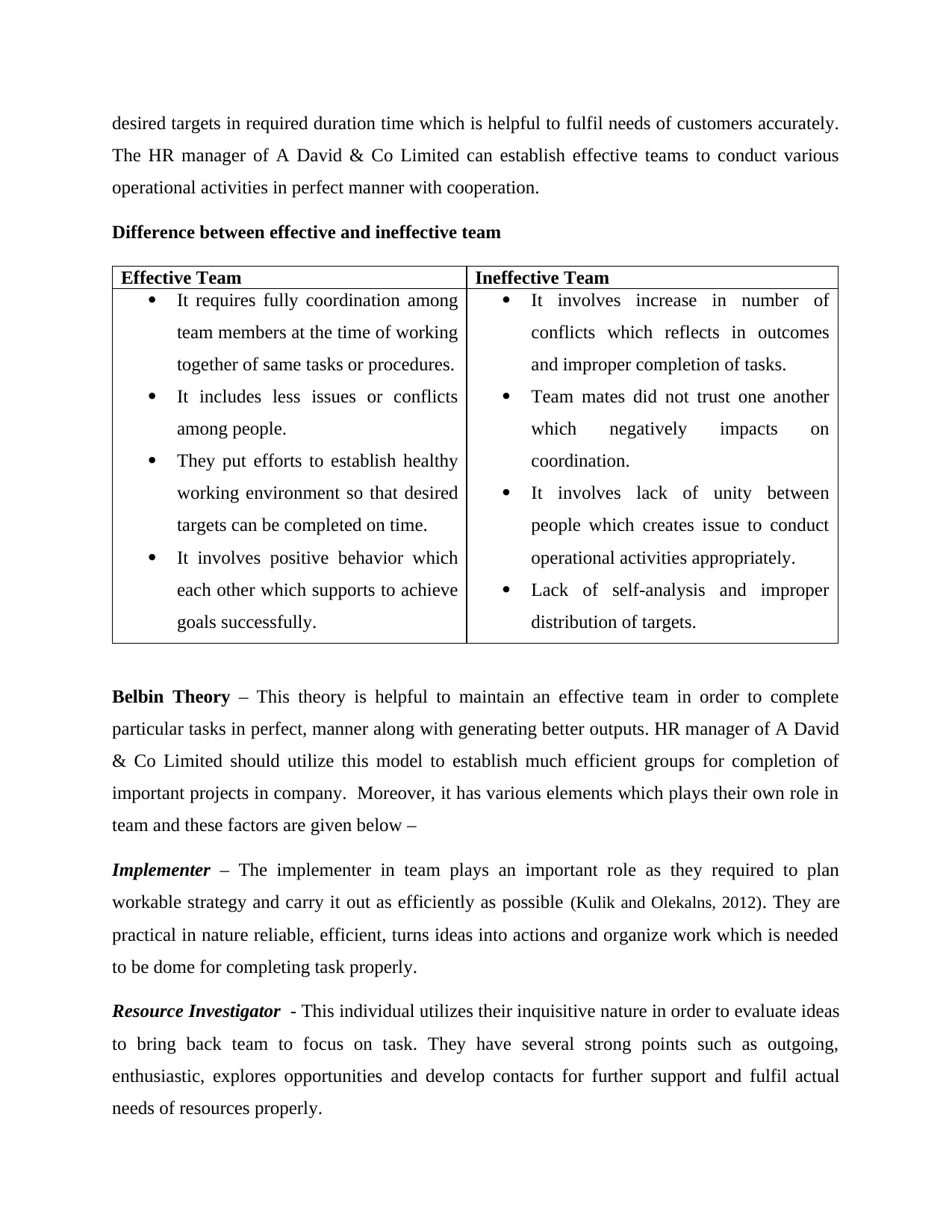
desired targets in required duration time which is helpful to fulfil needs of customers accurately.
The HR manager of A David & Co Limited can establish effective teams to conduct various
operational activities in perfect manner with cooperation.
Difference between effective and ineffective team
Effective Team Ineffective Team
It requires fully coordination among
team members at the time of working
together of same tasks or procedures.
It includes less issues or conflicts
among people.
They put efforts to establish healthy
working environment so that desired
targets can be completed on time.
It involves positive behavior which
each other which supports to achieve
goals successfully.
It involves increase in number of
conflicts which reflects in outcomes
and improper completion of tasks.
Team mates did not trust one another
which negatively impacts on
coordination.
It involves lack of unity between
people which creates issue to conduct
operational activities appropriately.
Lack of self-analysis and improper
distribution of targets.
Belbin Theory – This theory is helpful to maintain an effective team in order to complete
particular tasks in perfect, manner along with generating better outputs. HR manager of A David
& Co Limited should utilize this model to establish much efficient groups for completion of
important projects in company. Moreover, it has various elements which plays their own role in
team and these factors are given below –
Implementer – The implementer in team plays an important role as they required to plan
workable strategy and carry it out as efficiently as possible (Kulik and Olekalns, 2012). They are
practical in nature reliable, efficient, turns ideas into actions and organize work which is needed
to be dome for completing task properly.
Resource Investigator - This individual utilizes their inquisitive nature in order to evaluate ideas
to bring back team to focus on task. They have several strong points such as outgoing,
enthusiastic, explores opportunities and develop contacts for further support and fulfil actual
needs of resources properly.
The HR manager of A David & Co Limited can establish effective teams to conduct various
operational activities in perfect manner with cooperation.
Difference between effective and ineffective team
Effective Team Ineffective Team
It requires fully coordination among
team members at the time of working
together of same tasks or procedures.
It includes less issues or conflicts
among people.
They put efforts to establish healthy
working environment so that desired
targets can be completed on time.
It involves positive behavior which
each other which supports to achieve
goals successfully.
It involves increase in number of
conflicts which reflects in outcomes
and improper completion of tasks.
Team mates did not trust one another
which negatively impacts on
coordination.
It involves lack of unity between
people which creates issue to conduct
operational activities appropriately.
Lack of self-analysis and improper
distribution of targets.
Belbin Theory – This theory is helpful to maintain an effective team in order to complete
particular tasks in perfect, manner along with generating better outputs. HR manager of A David
& Co Limited should utilize this model to establish much efficient groups for completion of
important projects in company. Moreover, it has various elements which plays their own role in
team and these factors are given below –
Implementer – The implementer in team plays an important role as they required to plan
workable strategy and carry it out as efficiently as possible (Kulik and Olekalns, 2012). They are
practical in nature reliable, efficient, turns ideas into actions and organize work which is needed
to be dome for completing task properly.
Resource Investigator - This individual utilizes their inquisitive nature in order to evaluate ideas
to bring back team to focus on task. They have several strong points such as outgoing,
enthusiastic, explores opportunities and develop contacts for further support and fulfil actual
needs of resources properly.
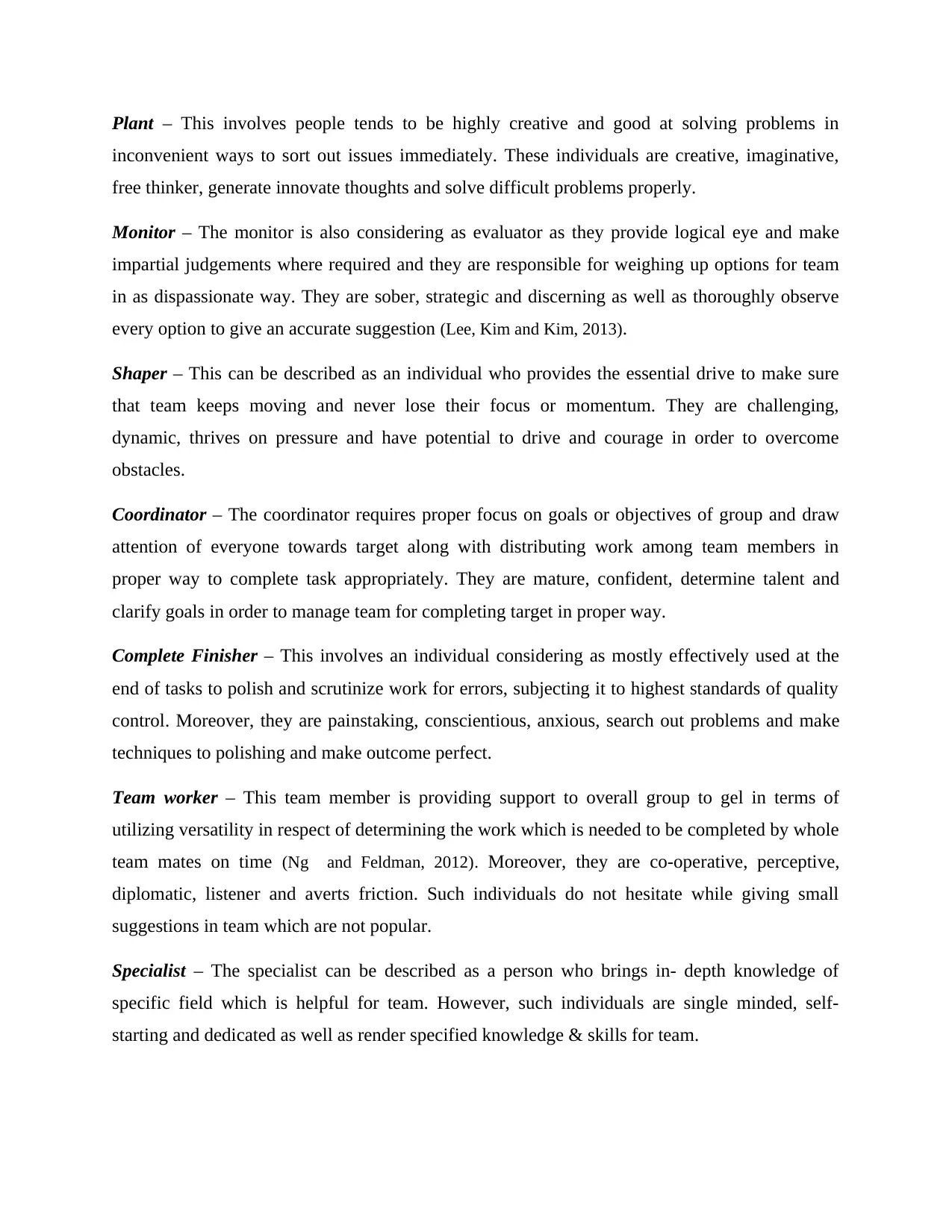
Plant – This involves people tends to be highly creative and good at solving problems in
inconvenient ways to sort out issues immediately. These individuals are creative, imaginative,
free thinker, generate innovate thoughts and solve difficult problems properly.
Monitor – The monitor is also considering as evaluator as they provide logical eye and make
impartial judgements where required and they are responsible for weighing up options for team
in as dispassionate way. They are sober, strategic and discerning as well as thoroughly observe
every option to give an accurate suggestion (Lee, Kim and Kim, 2013).
Shaper – This can be described as an individual who provides the essential drive to make sure
that team keeps moving and never lose their focus or momentum. They are challenging,
dynamic, thrives on pressure and have potential to drive and courage in order to overcome
obstacles.
Coordinator – The coordinator requires proper focus on goals or objectives of group and draw
attention of everyone towards target along with distributing work among team members in
proper way to complete task appropriately. They are mature, confident, determine talent and
clarify goals in order to manage team for completing target in proper way.
Complete Finisher – This involves an individual considering as mostly effectively used at the
end of tasks to polish and scrutinize work for errors, subjecting it to highest standards of quality
control. Moreover, they are painstaking, conscientious, anxious, search out problems and make
techniques to polishing and make outcome perfect.
Team worker – This team member is providing support to overall group to gel in terms of
utilizing versatility in respect of determining the work which is needed to be completed by whole
team mates on time (Ng and Feldman, 2012). Moreover, they are co-operative, perceptive,
diplomatic, listener and averts friction. Such individuals do not hesitate while giving small
suggestions in team which are not popular.
Specialist – The specialist can be described as a person who brings in- depth knowledge of
specific field which is helpful for team. However, such individuals are single minded, self-
starting and dedicated as well as render specified knowledge & skills for team.
inconvenient ways to sort out issues immediately. These individuals are creative, imaginative,
free thinker, generate innovate thoughts and solve difficult problems properly.
Monitor – The monitor is also considering as evaluator as they provide logical eye and make
impartial judgements where required and they are responsible for weighing up options for team
in as dispassionate way. They are sober, strategic and discerning as well as thoroughly observe
every option to give an accurate suggestion (Lee, Kim and Kim, 2013).
Shaper – This can be described as an individual who provides the essential drive to make sure
that team keeps moving and never lose their focus or momentum. They are challenging,
dynamic, thrives on pressure and have potential to drive and courage in order to overcome
obstacles.
Coordinator – The coordinator requires proper focus on goals or objectives of group and draw
attention of everyone towards target along with distributing work among team members in
proper way to complete task appropriately. They are mature, confident, determine talent and
clarify goals in order to manage team for completing target in proper way.
Complete Finisher – This involves an individual considering as mostly effectively used at the
end of tasks to polish and scrutinize work for errors, subjecting it to highest standards of quality
control. Moreover, they are painstaking, conscientious, anxious, search out problems and make
techniques to polishing and make outcome perfect.
Team worker – This team member is providing support to overall group to gel in terms of
utilizing versatility in respect of determining the work which is needed to be completed by whole
team mates on time (Ng and Feldman, 2012). Moreover, they are co-operative, perceptive,
diplomatic, listener and averts friction. Such individuals do not hesitate while giving small
suggestions in team which are not popular.
Specialist – The specialist can be described as a person who brings in- depth knowledge of
specific field which is helpful for team. However, such individuals are single minded, self-
starting and dedicated as well as render specified knowledge & skills for team.
⊘ This is a preview!⊘
Do you want full access?
Subscribe today to unlock all pages.

Trusted by 1+ million students worldwide
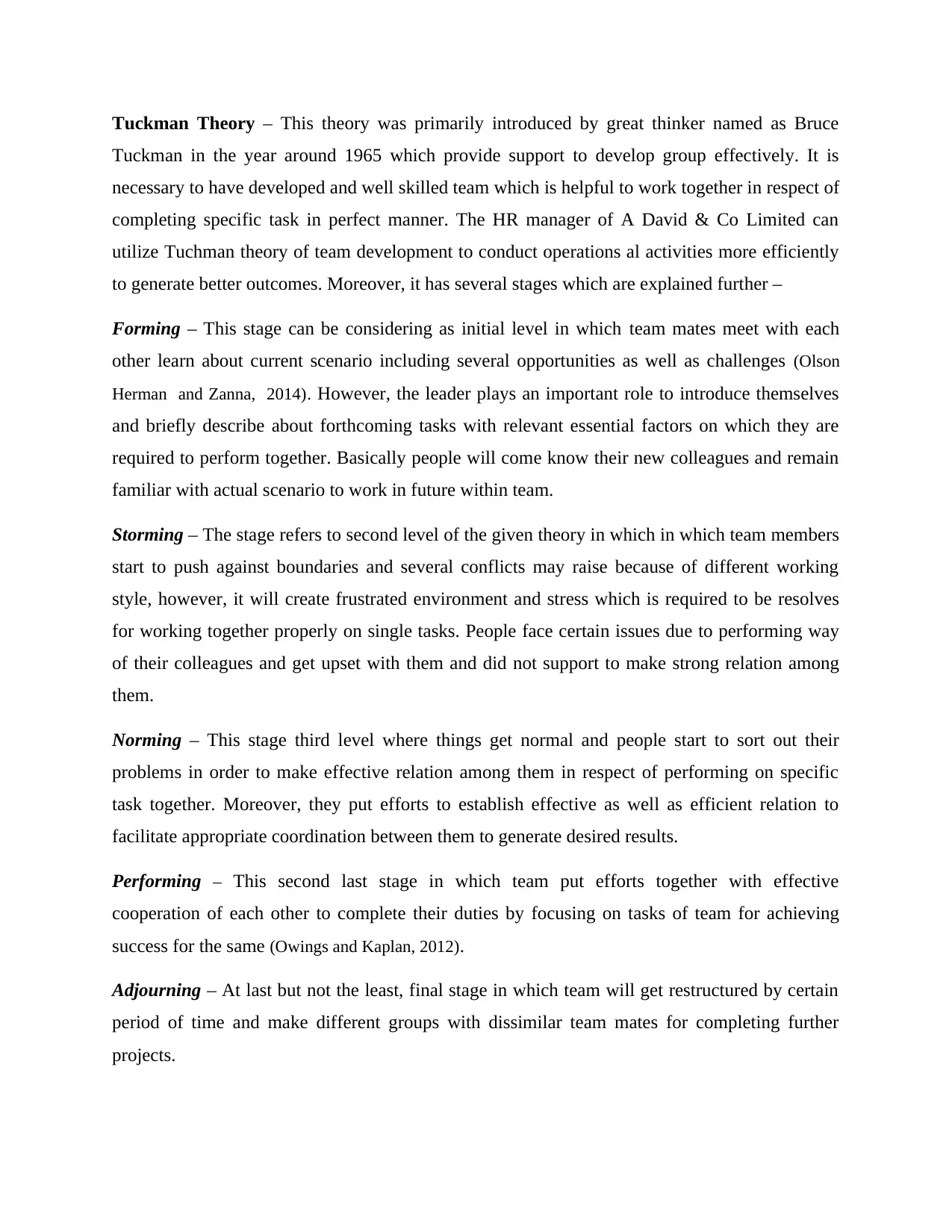
Tuckman Theory – This theory was primarily introduced by great thinker named as Bruce
Tuckman in the year around 1965 which provide support to develop group effectively. It is
necessary to have developed and well skilled team which is helpful to work together in respect of
completing specific task in perfect manner. The HR manager of A David & Co Limited can
utilize Tuchman theory of team development to conduct operations al activities more efficiently
to generate better outcomes. Moreover, it has several stages which are explained further –
Forming – This stage can be considering as initial level in which team mates meet with each
other learn about current scenario including several opportunities as well as challenges (Olson
Herman and Zanna, 2014). However, the leader plays an important role to introduce themselves
and briefly describe about forthcoming tasks with relevant essential factors on which they are
required to perform together. Basically people will come know their new colleagues and remain
familiar with actual scenario to work in future within team.
Storming – The stage refers to second level of the given theory in which in which team members
start to push against boundaries and several conflicts may raise because of different working
style, however, it will create frustrated environment and stress which is required to be resolves
for working together properly on single tasks. People face certain issues due to performing way
of their colleagues and get upset with them and did not support to make strong relation among
them.
Norming – This stage third level where things get normal and people start to sort out their
problems in order to make effective relation among them in respect of performing on specific
task together. Moreover, they put efforts to establish effective as well as efficient relation to
facilitate appropriate coordination between them to generate desired results.
Performing – This second last stage in which team put efforts together with effective
cooperation of each other to complete their duties by focusing on tasks of team for achieving
success for the same (Owings and Kaplan, 2012).
Adjourning – At last but not the least, final stage in which team will get restructured by certain
period of time and make different groups with dissimilar team mates for completing further
projects.
Tuckman in the year around 1965 which provide support to develop group effectively. It is
necessary to have developed and well skilled team which is helpful to work together in respect of
completing specific task in perfect manner. The HR manager of A David & Co Limited can
utilize Tuchman theory of team development to conduct operations al activities more efficiently
to generate better outcomes. Moreover, it has several stages which are explained further –
Forming – This stage can be considering as initial level in which team mates meet with each
other learn about current scenario including several opportunities as well as challenges (Olson
Herman and Zanna, 2014). However, the leader plays an important role to introduce themselves
and briefly describe about forthcoming tasks with relevant essential factors on which they are
required to perform together. Basically people will come know their new colleagues and remain
familiar with actual scenario to work in future within team.
Storming – The stage refers to second level of the given theory in which in which team members
start to push against boundaries and several conflicts may raise because of different working
style, however, it will create frustrated environment and stress which is required to be resolves
for working together properly on single tasks. People face certain issues due to performing way
of their colleagues and get upset with them and did not support to make strong relation among
them.
Norming – This stage third level where things get normal and people start to sort out their
problems in order to make effective relation among them in respect of performing on specific
task together. Moreover, they put efforts to establish effective as well as efficient relation to
facilitate appropriate coordination between them to generate desired results.
Performing – This second last stage in which team put efforts together with effective
cooperation of each other to complete their duties by focusing on tasks of team for achieving
success for the same (Owings and Kaplan, 2012).
Adjourning – At last but not the least, final stage in which team will get restructured by certain
period of time and make different groups with dissimilar team mates for completing further
projects.
Paraphrase This Document
Need a fresh take? Get an instant paraphrase of this document with our AI Paraphraser
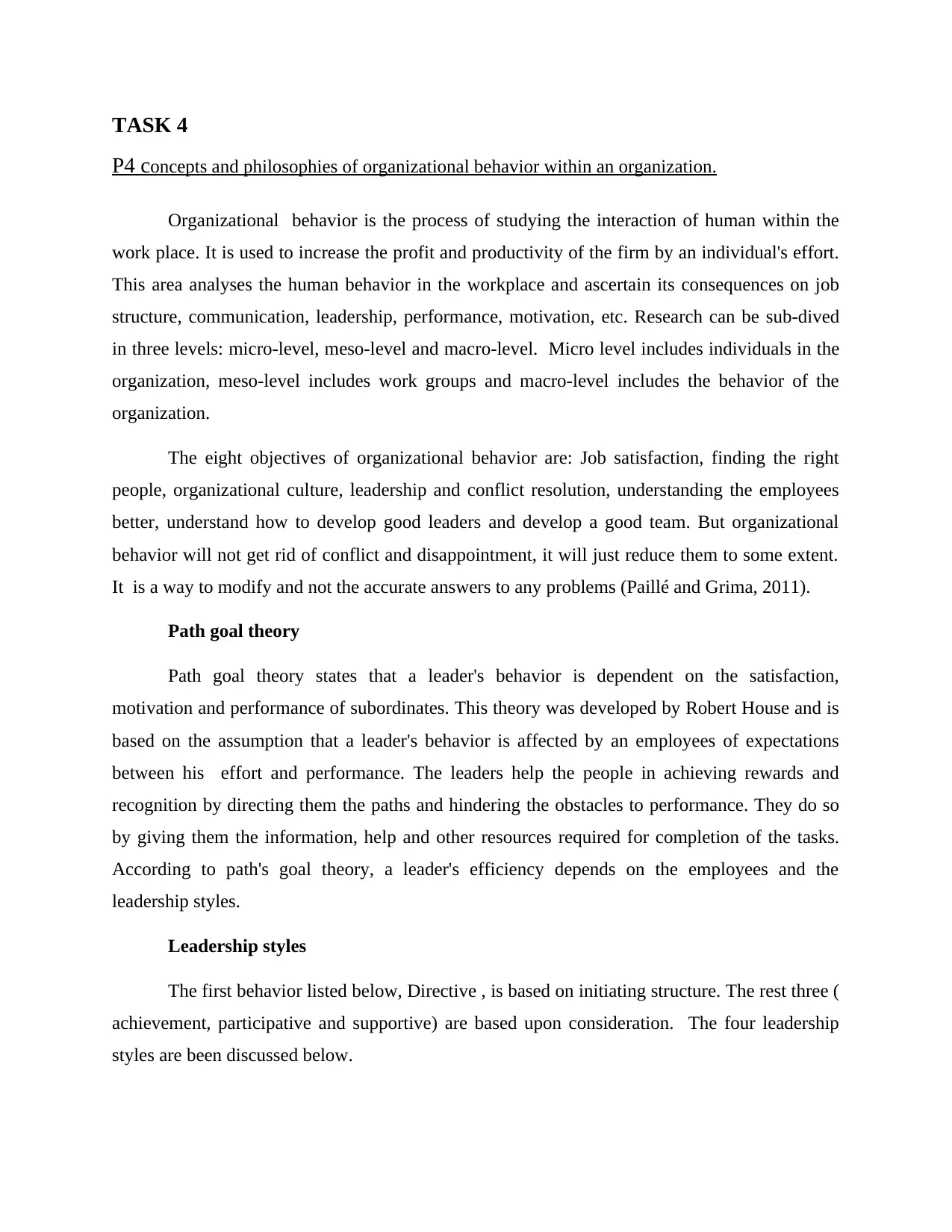
TASK 4
P4 concepts and philosophies of organizational behavior within an organization.
Organizational behavior is the process of studying the interaction of human within the
work place. It is used to increase the profit and productivity of the firm by an individual's effort.
This area analyses the human behavior in the workplace and ascertain its consequences on job
structure, communication, leadership, performance, motivation, etc. Research can be sub-dived
in three levels: micro-level, meso-level and macro-level. Micro level includes individuals in the
organization, meso-level includes work groups and macro-level includes the behavior of the
organization.
The eight objectives of organizational behavior are: Job satisfaction, finding the right
people, organizational culture, leadership and conflict resolution, understanding the employees
better, understand how to develop good leaders and develop a good team. But organizational
behavior will not get rid of conflict and disappointment, it will just reduce them to some extent.
It is a way to modify and not the accurate answers to any problems (Paillé and Grima, 2011).
Path goal theory
Path goal theory states that a leader's behavior is dependent on the satisfaction,
motivation and performance of subordinates. This theory was developed by Robert House and is
based on the assumption that a leader's behavior is affected by an employees of expectations
between his effort and performance. The leaders help the people in achieving rewards and
recognition by directing them the paths and hindering the obstacles to performance. They do so
by giving them the information, help and other resources required for completion of the tasks.
According to path's goal theory, a leader's efficiency depends on the employees and the
leadership styles.
Leadership styles
The first behavior listed below, Directive , is based on initiating structure. The rest three (
achievement, participative and supportive) are based upon consideration. The four leadership
styles are been discussed below.
P4 concepts and philosophies of organizational behavior within an organization.
Organizational behavior is the process of studying the interaction of human within the
work place. It is used to increase the profit and productivity of the firm by an individual's effort.
This area analyses the human behavior in the workplace and ascertain its consequences on job
structure, communication, leadership, performance, motivation, etc. Research can be sub-dived
in three levels: micro-level, meso-level and macro-level. Micro level includes individuals in the
organization, meso-level includes work groups and macro-level includes the behavior of the
organization.
The eight objectives of organizational behavior are: Job satisfaction, finding the right
people, organizational culture, leadership and conflict resolution, understanding the employees
better, understand how to develop good leaders and develop a good team. But organizational
behavior will not get rid of conflict and disappointment, it will just reduce them to some extent.
It is a way to modify and not the accurate answers to any problems (Paillé and Grima, 2011).
Path goal theory
Path goal theory states that a leader's behavior is dependent on the satisfaction,
motivation and performance of subordinates. This theory was developed by Robert House and is
based on the assumption that a leader's behavior is affected by an employees of expectations
between his effort and performance. The leaders help the people in achieving rewards and
recognition by directing them the paths and hindering the obstacles to performance. They do so
by giving them the information, help and other resources required for completion of the tasks.
According to path's goal theory, a leader's efficiency depends on the employees and the
leadership styles.
Leadership styles
The first behavior listed below, Directive , is based on initiating structure. The rest three (
achievement, participative and supportive) are based upon consideration. The four leadership
styles are been discussed below.
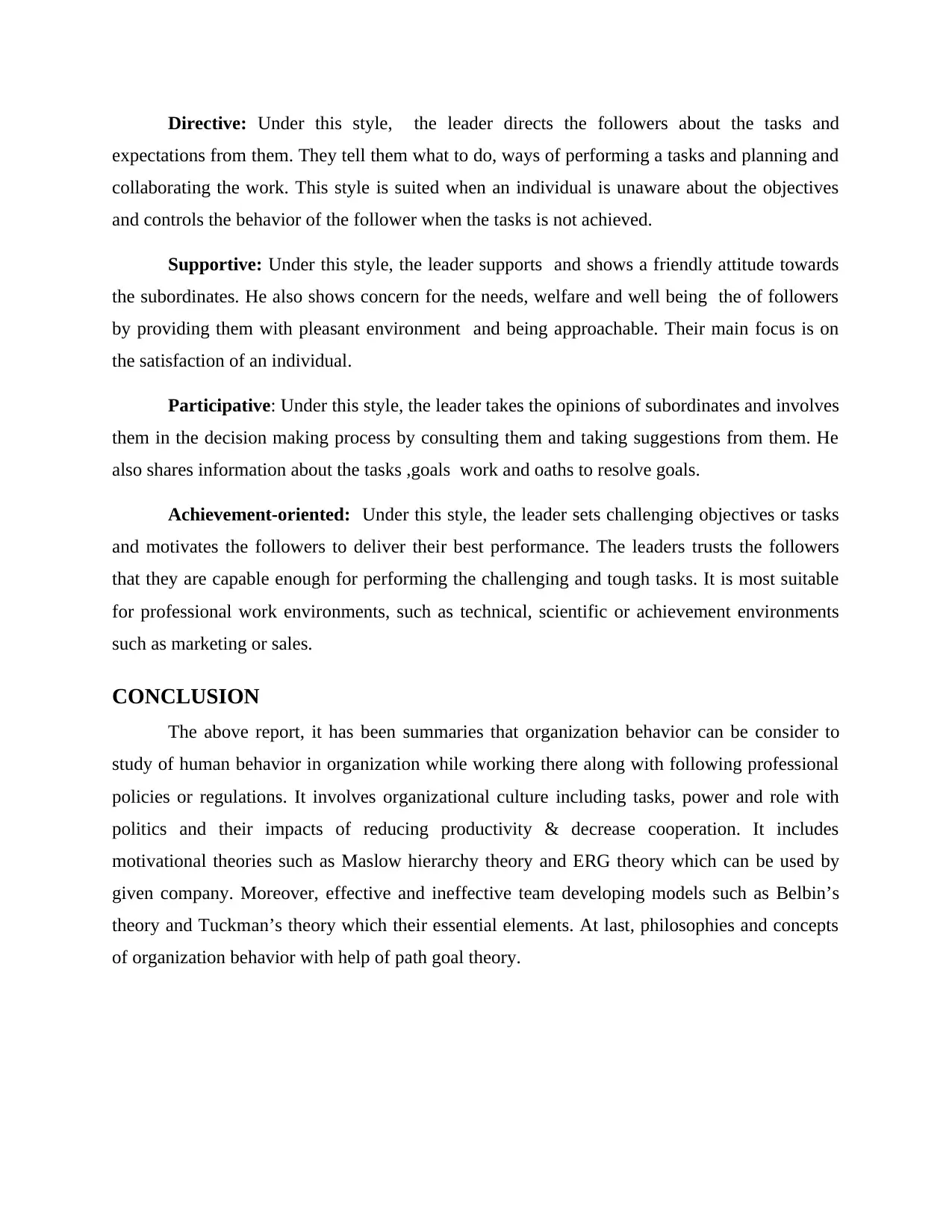
Directive: Under this style, the leader directs the followers about the tasks and
expectations from them. They tell them what to do, ways of performing a tasks and planning and
collaborating the work. This style is suited when an individual is unaware about the objectives
and controls the behavior of the follower when the tasks is not achieved.
Supportive: Under this style, the leader supports and shows a friendly attitude towards
the subordinates. He also shows concern for the needs, welfare and well being the of followers
by providing them with pleasant environment and being approachable. Their main focus is on
the satisfaction of an individual.
Participative: Under this style, the leader takes the opinions of subordinates and involves
them in the decision making process by consulting them and taking suggestions from them. He
also shares information about the tasks ,goals work and oaths to resolve goals.
Achievement-oriented: Under this style, the leader sets challenging objectives or tasks
and motivates the followers to deliver their best performance. The leaders trusts the followers
that they are capable enough for performing the challenging and tough tasks. It is most suitable
for professional work environments, such as technical, scientific or achievement environments
such as marketing or sales.
CONCLUSION
The above report, it has been summaries that organization behavior can be consider to
study of human behavior in organization while working there along with following professional
policies or regulations. It involves organizational culture including tasks, power and role with
politics and their impacts of reducing productivity & decrease cooperation. It includes
motivational theories such as Maslow hierarchy theory and ERG theory which can be used by
given company. Moreover, effective and ineffective team developing models such as Belbin’s
theory and Tuckman’s theory which their essential elements. At last, philosophies and concepts
of organization behavior with help of path goal theory.
expectations from them. They tell them what to do, ways of performing a tasks and planning and
collaborating the work. This style is suited when an individual is unaware about the objectives
and controls the behavior of the follower when the tasks is not achieved.
Supportive: Under this style, the leader supports and shows a friendly attitude towards
the subordinates. He also shows concern for the needs, welfare and well being the of followers
by providing them with pleasant environment and being approachable. Their main focus is on
the satisfaction of an individual.
Participative: Under this style, the leader takes the opinions of subordinates and involves
them in the decision making process by consulting them and taking suggestions from them. He
also shares information about the tasks ,goals work and oaths to resolve goals.
Achievement-oriented: Under this style, the leader sets challenging objectives or tasks
and motivates the followers to deliver their best performance. The leaders trusts the followers
that they are capable enough for performing the challenging and tough tasks. It is most suitable
for professional work environments, such as technical, scientific or achievement environments
such as marketing or sales.
CONCLUSION
The above report, it has been summaries that organization behavior can be consider to
study of human behavior in organization while working there along with following professional
policies or regulations. It involves organizational culture including tasks, power and role with
politics and their impacts of reducing productivity & decrease cooperation. It includes
motivational theories such as Maslow hierarchy theory and ERG theory which can be used by
given company. Moreover, effective and ineffective team developing models such as Belbin’s
theory and Tuckman’s theory which their essential elements. At last, philosophies and concepts
of organization behavior with help of path goal theory.
⊘ This is a preview!⊘
Do you want full access?
Subscribe today to unlock all pages.

Trusted by 1+ million students worldwide
1 out of 14
Related Documents
Your All-in-One AI-Powered Toolkit for Academic Success.
+13062052269
info@desklib.com
Available 24*7 on WhatsApp / Email
![[object Object]](/_next/static/media/star-bottom.7253800d.svg)
Unlock your academic potential
Copyright © 2020–2026 A2Z Services. All Rights Reserved. Developed and managed by ZUCOL.





